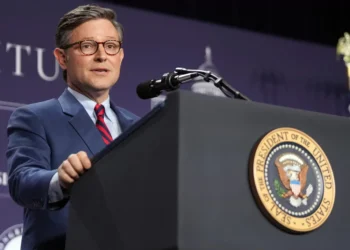President Donald Trump is in the midst of his first real foreign trip in his second term, visiting the Middle East. It may be largely a desert, but he certainly made a splash.
Since launching his first presidential bid in 2015, Trump has refashioned the Republican Party into a more populist entity. On few subjects is this as true as it is for foreign policy, which he illustrated with Tuesday’s remarkable speech in Riyadh, Saudi Arabia.
President Woodrow Wilson famously proclaimed that America’s duty is to “make the world safe for democracy.” George W. Bush responded to the 9/11 attacks with a Wilsonian effort to export democracy through nation-building in the Middle East.
Reality proved that dream to be an expensive failure, in large part because, frankly, Islam is incompatible with Western government. What made our Republic work was Christianity. Muslims seem more inclined to government by a strongman, and the U.S. won’t change that with an invasion followed by instructions for government and a few Barack Obama lectures about democracy and human rights.
“Before our eyes,” Trump said, “a new generation of leaders is transcending the ancient conflicts and tired divisions of the past, and forging a future where the Middle East is defined by commerce, not chaos; where it exports technology, not terrorism; and where people of different nations, religions, and creeds are building cities together, not bombing each other out of existence.”
He both rebuked American leaders and buttered up his audience with flattery. “This great transformation has not come from Western interventionists … giving you lectures on how to live or how to govern your own affairs,” he told them. “No, the gleaming marvels of Riyadh and Abu Dhabi were not created by the so-called ‘nation-builders,’ ‘neo-cons,’ or ‘liberal nonprofits,’ like those who spent trillions failing to develop Kabul and Baghdad, so many other cities. Instead, the birth of a modern Middle East has been brought about by the people of the region themselves … developing your own sovereign countries, pursuing your own unique visions, and charting your own destinies.”
Essentially, it’s once again The Art of the Deal. Trump’s core belief is that the most important thing is fair deals that benefit America, not exporting ideology.
“President Trump is a realist,” explains Ben Shapiro. “He wants to be involved where it is in the interests of the United States to be involved. He doesn’t want to dictate to the Saudis; he was there to get deals done. His biggest contribution is the idea that commerce trumps ideology.”
John Daniel Davidson agrees. “Look out for the American people and the American people alone,” Davidson says, summing up Trump’s policies. “If it doesn’t profit or prosper America to be meddling in some foreign backwater, then we should leave it alone. If they threaten us, we should make clear that the cost of harming us is higher than they can pay. This is peace through strength.”
See the successful strikes against the terrorist Houthis for evidence of Trump’s “stick” in action.
He’s also not afraid to use carrots, talking about removing all sanctions against Syria and meeting with its new leader, Ahmed al-Shara, who was once a jihadist loyal to al-Qaida and, as a result, a “resident” of Abu Ghraib prison. Shara helped oust Bashar al-Assad, and Trump wants to give him “a chance at greatness.” He’s the first American president to meet with his Syrian counterpart in decades.
“I am willing to end past conflicts and forge new partnerships for a better and more stable world, even if our differences may be very profound,” Trump said on Tuesday. Yet he went much further and deeper, adding, “In recent years, far too many American presidents have been afflicted with the notion that it’s our job to look into the souls of foreign leaders and use U.S. policy to dispense justice for their sins. … I believe it is God’s job to sit in judgement. My job [is] to defend America and to promote the fundamental interests of stability, prosperity, and peace.”
Trump and Saudi Crown Prince Mohammed bin Salman signed a $600 billion investment deal, and the president is pushing hard for the Saudis to join the Abraham Accords, one of the great achievements of his first term. That gambit has as much to do with Iran as anything else.
Again, his goal is to make deals, not democracy. That seems likely to benefit the American people.













